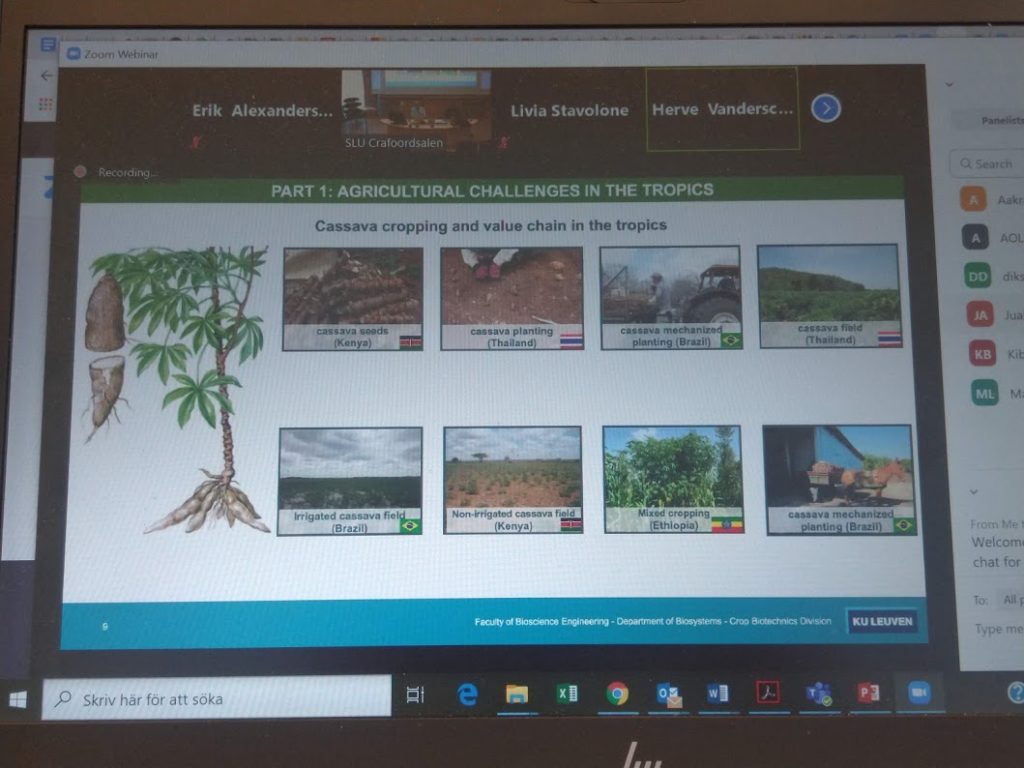Sub-Saharan Africa (SSA) is the region in the world with the highest prevalence of undernourishment. To abolish hunger and feed a growing population without depleting natural resources, new innovations and tools are required.
The agricultural challenge SSA is facing in relation to possible implications of plant biotechnology were in focus during this two-part webinar held 23 and 24 September 2020. The first part on policy around plant biotechnology in SSA was followed by presentations focused on the potential use of plant biotechnology for cassava and potato crop improvement in sub-Saharan Africa.
Below follows a summary of the panel discussion ending the first session as well as link to the recording of the discussion and links to the presenting slides of selected talks.
This webinar took place as a part of a collaboration between SLU, CIP, IITA and UBIC funded by the VR Swedish Research Links.
Panel discussion: The current status of plant biotechnological innovations in sub-Saharan Africa
Participants: Isaac Ongu (SCIFODE), Marc Heijde (IPBO, VIB Ghent), John Komen (Komen Bioscience Consultancy), Leena Tripathi (IITA) and Marc Ghislain (CIP). Moderator: Dennis Eriksson (SLU)
With five panelists and about 30 attendees, the workshop panel discussion took many interesting directions. An initial observation was that the region sub-Saharan Africa (SSA) has 44 countries and it is impossible to generalise about their respective approaches to biotechnological innovations in plant breeding. Nevertheless, there is a certain amount of convergence between more general agricultural policies, and in some countries agricultural growth and more specifically the inclusion of biotech crops is taking part in the overall plans. There are some initiatives to enable the transfer of data from field trials between countries. However, one factor that may complicate any harmonised regional approach to plant biotechnology is that there may be goal conflicts between different competent authorities on a national level.
It was agreed that internal capacity-building is very important, to fully explore the benefits of new technologies and to develop a national capacity for implementation of a biosafety legislative framework. A comment from the audience mentioned that South Africa has made good progress in factoring plant biotech work into tertiary level training.
To the question on what is influencing plant biotech policies in the SSA region, the panelists highlighted some of what they consider the most important factors. Among the internal factors, the national agricultural policies as well as the presence of a strong R&D sector were emphasized. Also the importance of particular crops, and their associated socio-economic components, were mentioned. The most critical external factors are the influence of critical advocacy groups, which stresses the importance of good communication to build awareness, and also the links to trade and other international economic factors.
The European Union (EU) and its plant biotechnology policies may also have an influence, and in this context it is important to correctly interpret current developments in the EU regarding breeding innovations. Many countries try to align their GMO definition with the Cartagena Protocol definition of a Living Modified Organism (LMO), and whereas it is true that the LMO definition allows for a differentiated approach towards the products of gene editing, this also leaves the door open for national competent authorities in SSA to make their own interpretations.
A final statement from the audience emphasized that Africa should not be a follower of either Europe or North America, but instead decide for itself based on the available scientific evidences and empirical experiences. In this regard, the African Union Commission has an important role in guiding and building the confidences of the member states.
The recorded discussion can be seen here
Available presentation webinar slides
Project presentation “Plant Biotechnology in sub-Saharan Africa”. Project coordinator Erik Alexandersson, SLU, Sweden
“Plant biotechnology in Kenya, Nigeria, Uganda and the European Union: convergence or divergence of policies and regulatory practice?”. Isaac Ongu, SCIFODE, Uganda
“Happy Tropics: Molecular Innovations, Technology Transfer, Education and Beyond”. Herve Vanderschuren, University of Liège, Belgium
“Profiling, tissue culture and gene editing of Nigerian cassava landraces”, Priscilla Olayide, IITA, Nigeria
“Bioengineered potato with late blight disease resistance in field trials in Sweden and East Africa”, Erik Andreasson, SLU, Sweden and Marc Ghislain, CIP, Kenya


